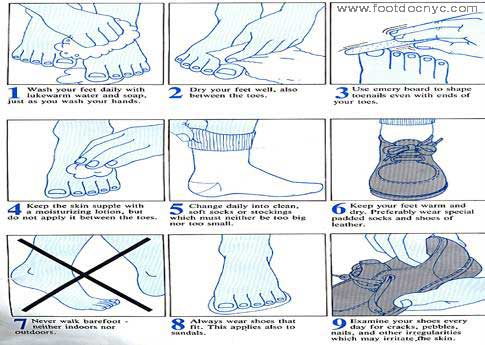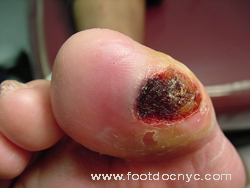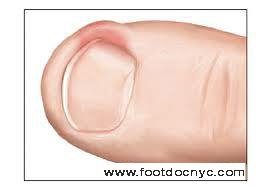Diabetic Foot Care
By Isaac Tabari
Diabetic foot care performed by podiatrists in Midtown, NYC
Foot problems commonly develop in people with diabetes and can quickly become serious.
- With damage to the nervous system, a person with diabetes may not be able to feel his or her feet properly. Normal sweat secretion and oil production that lubricates the skin of the foot is impaired. These factors together can lead to abnormal pressure on the skin, bones, and joints of the foot during walking and can lead to breakdown of the skin of the foot. Sores may develop.
- Damage to blood vessels and impairment of the immune system from diabetes make it difficult to heal these wounds. Bacterial infection of the skin, connective tissues, muscles, and bones can then occur. These infections can develop into gangrene. Because of the poor blood flow, antibiotics cannot get to the site of the infection easily. Often, the only treatment for this is amputation of the foot or leg. If the infection spreads to the bloodstream, this process can be life-threatening.
- People with diabetes must be fully aware of how to prevent foot problems before they occur, to recognize problems early, and to seek the right treatment when problems do occur. Although treatment for diabetic foot problems has improved, prevention - including good control of blood sugar level - remains the best way to prevent diabetic complications.
Do you want to avoid serious foot problems that can lead to a toe, foot, or leg amputation? It's all about taking good care of your feet. Foot care is very important for every person with diabetes, but especially if you have:
- Persistent pain, which can by a symptom of sprain, strain, bruise, overuse, improperly fitting shoes, or underlying infection
- Redness, which can be a sign of infection, especially when surrounding a wound, or of abnormal rubbing of shoes and sucks.
- Swelling of the feet or legs, which can be a sign of underlying inflammation or infection, improperly fitting shoes, or poor venous circulation.
- Pain in the legs or buttocks that increases with walking but improves with rest.
- Hair no longer growing on the lower legs and feet.
- Hard shiny skin on the legs
- Localized warmth can be a sign of infection or inflammation, such as from wounds that won't heal or heal slowly.
- Any break in the skin, such as one from abnormal wear and tear, injury, or infection.
- Calluses and corns may be a sign of chronic trauma to foot.
- Toenail fungus, athlete's foot, and ingrown toenails may lead to more serious bacterial infections.
- Drainage of pus from a wound which may be a sign of infection. Persistent bloody drainage is a sign of a serious foot problem.
- Limp or difficulty walking - sign of joint problems, serious infection or improperly fitted shoes.
- Fever or chills in association with a wound, which may be a sign of a limb or life-threatening infection
- Loss of feeling in your feet, numbness can be a sign of nerve damage from diabetes, which increases risk of leg and foot problems.
- Foot ulcers or sores that do not heal
Nerve damage can cause you to lose feeling in your feet. You may not feel a pebble inside your sock that is causing a sore. You may not feel a blister caused by poorly fitting shoes. Foot injuries such as these can cause ulcers, which may lead to amputation.
Keeping your blood glucose (sugar) in good control and taking care of your feet every day can help you avoid serious foot problems.
Share your plan with your foot doctor / podiatrist and get his/her help when you need it. There is a lot you can do to prevent serious problems with your feet. Here's how:

1. Take care of your diabetes.
- Make healthy lifestyle choices to help keep your blood glucose (sugar), blood pressure, and cholesterol levels close to normal. Doing so may help prevent or delay diabetes-related foot problems as well as heart, eye, and kidney disease.
- Work with your health care team to make a diabetes plan that fits your lifestyle. The team may include your primary doctor, a diabetes educator, a nurse, a dietitian, a foot care doctor called a podiatrist and other specialists. This team will help you to:
- Know when to get your diabetes ABCs checked: A1C* (blood glucose), Blood pressure, and Cholesterol.
- Know how and when to test your blood glucose.
- Take your medicines as prescribed.
- Eat regular meals that contain a variety of healthy, low-fat, high-fiber foods including fruits and vegetables each day.
- Get physical activity each day.
- Stop smoking.
- Follow your foot care plan.
- Keep all your appointments and have your feet, eyes, and kidneys checked at least once a year.
- Visit your dentist twice a year.
*A1C is an average measure of your blood glucose over a 3-month period.
2. Check your feet every day.
You may have serious foot problems, but feel no pain. Check your feet for cuts, sores, red spots, swelling, and infected toenails. Find a time (evening is best) to check your feet each day. Make checking your feet part of your every day routine. If you have trouble bending over to see your feet, use a plastic mirror to help. You also can ask a family member or caregiver to help you.
Make sure to call your NYC Foot Doctor Podiatrist at 718-266-1986 team right away if a cut, sore, blister, or bruise on your foot does not begin to heal after one day.
3. Wash your feet every day.
- Wash your feet in warm, not hot, water. Do not soak your feet because your skin will get dry afterwards.
- Before bathing or showering, test the water to make sure it is not too hot. You can use a thermometer (90° to 95° F is safe) or your elbow.
- Dry your feet well. Be sure to dry between your toes. Use talcum powder or cornstarch to keep the skin between your toes dry.
4. Keep the skin soft and smooth.
- Rub a thin coat of skin lotion, cream, or petroleum jelly on the tops and bottoms of your feet.
- Do not put lotion or cream between your toes because this might cause an infection.
5. Smooth corns and calluses gently.
- If you have corns and calluses, check with your podiatrist about the best way to care for them.
- If your NYC foot doctor tells you to, use a pumice stone to smooth corns and calluses after bathing or showering.
- A pumice stone is a type of rock used to smooth the skin. Rub gently, only in one direction, to avoid tearing the skin.
- Do not cut corns and calluses. Don't use razor blades, corn plasters, or liquid corn and callus removers - they can damage your skin.
6. Trim your toenails each week or when needed.
- Have a foot doctor trim your toenails if you can't see well, if you cannot reach your feet, if your toenails are thick or yellowed, or if your nails curve and grow into the skin.
- If you can see and reach your toenails, trim them with clippers after you wash and dry your feet.
- Trim toenails straight across and smooth them with an emery board or nail file.
- Do not cut into the corners of the toenail.
*** Trim your toenails straight across and smooth them with a nail file.
7. Wear shoes and socks at all times.
- Wear shoes and socks at all times. Do not walk barefoot - not even indoors - because it is easy to step on something and hurt your feet.
- Always wear socks, stockings, or nylons with your shoes to help avoid blisters and sores.
- Choose clean, lightly padded socks that fit well. Socks that have no seams are best.
- Check the insides of your shoes before you put them on to be sure the lining is smooth and that there are no objects in them.
- Wear shoes that fit well and protect your feet.
8. Protect your feet from hot and cold.
- Wear shoes at the beach or on hot pavement.
- Put sunscreen on the top of your feet to prevent sunburn.
- Keep your feet away from radiators and open fires.
- Do not put hot water bottles or heating pads on your feet.
- Wear socks at night if your feet get cold. Lined boots are good in winter to keep your feet warm.
- Check your feet often in cold weather to avoid frostbite.
9. Keep the blood flowing to your feet.
- Put your feet up when you are sitting.
- Wiggle your toes for 5 minutes, two or three times a day. Move your ankles up and down and in and out to improve blood flow in your feet and legs.
- Do not cross your legs for long periods of time.
- Do not wear tight socks, elastic or rubber bands, or garters around your legs.
- Do not smoke. Smoking reduces blood flow to your feet. Ask for help to stop smoking.
- Work with your health care team to control your A1C (blood glucose), blood pressure and cholesterol.
10. Be more active.
- Ask your NYC Podiatrist or Primary Doctor to help you plan a daily activity program that is right for you.
- Walking, dancing, swimming, and bicycling are good forms of exercise that are easy on the feet.
- Avoid activities that are hard on the feet, such as running and jumping.
- Always include a short warm-up and cool-down period.
- Wear athletic shoes that fit well and that provide good support.
11. Be sure to ask your Foot Doctor / Podiatrist to:
- Tell you if you are likely to have serious foot problems. If you have serious foot problems, your feet should be checked at every visit to your doctor.
- Check the sense of feeling and pulses in your feet at least once a year.
- Show you how to care for your feet.
- Decide if special shoes would help your feet stay healthy.
12. Get started now.
- Begin taking good care of your feet today.
- Set a time every day to check your feet.
- Note the date of your next visit to the doctor.
- Cut out the foot care tip sheet in this booklet and put it on your bathroom or bedroom wall or nightstand as a reminder.
- Set a date for buying the things you need to take care of your feet: nail clippers, pumice stone, emery board, skin lotion, talcum powder, plastic mirror, socks, athletic shoes, and slippers.
- Most important, stick with your foot care program.and give yourself a special treat such as a new pair of soft, lightly padded socks. You deserve it!
13. Tips for Proper Footwear
- Proper footwear is very important for preventing serious foot problems. Athletic or walking shoes are good for daily wear. They support your feet and allow them to "breathe."
- Never wear vinyl or plastic shoes because they don't stretch or "breathe."
- When buying shoes, make sure they are comfortable from the start and have enough room for your toes.Don't buy shoes with pointed toes or high heels. They put too much pressure on your toes.
* Extra depth shoes look like athletic or walking shoes, but have more room in them. The extra room allows for different shaped feet and toes or for special inserts made to fit your feet.
14. Ask your doctor about Medicare or other insurance coverage for special footwear.
You may need special shoes or shoe inserts to prevent serious foot problems. If you have Medicare Part B insurance, you may be able to get some of the cost of special shoes or inserts paid for. Ask your doctor whether you qualify for
- 1 pair of extra depth shoes* and 3 pairs of inserts, or
- 1 pair of custom molded shoes (including inserts) and 2 additional pairs of inserts.
If you qualify for Medicare or other insurance coverage and would benefit from the use of the shoes, your NYC foot doctor or podiatrist will tell you how to get your special shoes.
Ask your doctor to check the sense of feeling in your feet.

For more information on diabetes and your feet and diabetic foot care or to make an appointment with the NYC Podiatrist Diabetic Foot Doctor, please call (212) 288-3137 or click here to make an appointment.
For more information about Diabetes, please contact:
American Diabetes Association
www.diabetes.org
800-DIABETES (800-342-2383)
***This material is only provided as helpful information and not as medical advice and you should consult with your foot doctor or another medical doctor for a professional diagnosis. ***
For more information on Diabetic Foot Care services and to make an appointment with best NYC podiatrist - foot doctor, please call us at (212) 288-3137 or click below to make an appointment:

|












